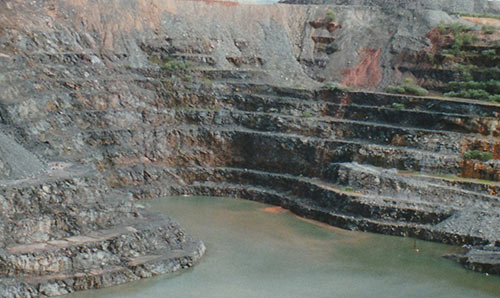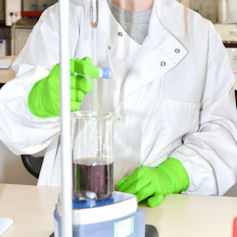
Environment and society
Human activities are changing the world and environment we live in. Our research directly addresses the issues societies are currently facing and those they are likely to face in the future.
Our facilities
We use innovative research approaches, which we develop in the Williamson Research Centre and Centre for Atmospheric Science.

At no other time in history has a deeper functional understanding of the Earth's resources and the complexities of interactions between our planet and human activity been so imperative to the quality of life of future generations.
Pollution and climate change are creating unprecedented challenges for humans and society around the world. If human activities are to be sustainable, a huge amount of research is required into how we can mitigate the difficulties that we, and future generations, will face. These include reducing the pollution we cause, using resources more efficiently, and minimising our impact on the Earth system, as well as the impact that these systems have on us - be they climate, oceans or land environments.
Our researchers, in collaboration with a variety of academic, industry, government and NGO partners, are undertaking world-class research on the processes underpinning the sustainable use of key Earth resources. This research not only leads to academic advances but also has a genuine positive impact on people's lives. For example, we have gained a better understanding of processes that may to lead to the control of toxic arsenic in groundwater-derived drinking water, and we have developed 3D models of petroleum reservoirs for more efficient and less wasteful recovery of oil and gas.
The issues our research tackles are also strongly reflected in our undergraduate and postgraduate teaching.
Research highlights
Weather effects on COVID-19 transmission
Because most respiratory viral infections peak in different seasons, many researchers suspected that COVID-19 might have similar behavior. Hundreds of studies on how weather influenced COVID-19 were carried out and were published quickly. However, our researchers have shown that many of these peer-reviewed scientific journal articles contained weaknesses or flaws that has affected the reliability and accuracy of the results. We have proposed tests that future analyses need to consider to improve our scientific understanding of seasonality of diseases.
Understanding the effects of pollution on climate
Our researchers are closer to understanding how the darkness of atmospheric soot particles is controlled by transparent coatings - a breakthrough that will help inform global policymakers looking at the effects of pollution on climate. The team tested different soot types during Bonfire Night in 2014 which, due to the weather conditions, was particularly polluted and provided an ideal opportunity to study a high concentration of atmospheric wood smoke particles.
Areas of expertise
Our researchers focus their work in the following specialist areas:
-
Climate and weather impacts on society
Human activity changes the climate, and the climate and weather also present hazards and challenges to society. Our activities include investigating the response of weather phenomena, including severe storms, and components of the climate system to change, as well as subsequent potential impact on society - and even the impact of weather on disease.
Read more
-
Energy transition
Our research in this area is delivering knowledge and training for the next generation of geoscientists and engineers to successfully meet the climate change challenge of attaining net zero carbon emissions and delivering secure and sustainable energy for the 21st Century.
Read more
-
Environment and health
The health of human populations is strongly influenced by the environment; over 25% of global mortality is associated with environmental factors including excessive heat, poor air quality and poor water quality, the spread of disease and food shortages. We're addressing all of these topics, including air and water quality in the UK and India, mosquito ecology, genotoxic pollutants in rice, prediction of extreme weather events and solar radiation and skin cancer.
-
Molecular environmental science
Understanding the chemical interactions in environmental systems is key to showing how these systems function. Our research focuses on the characterisation of mineral-water-organic matter reactions in surface and subsurface environments. Using advanced techniques from the physical, chemical and biological sciences, coupled with modelling, our researchers identify molecular-scale mechanisms of environmental processes that have global implications.
Read more
-
Nuclear environmental science
Getting a clear picture of the fundamental biogeochemical, geomicrobiological and mineralogical interactions of radionuclides in the environment is vital to minimising their impact. Our researchers study these topics in relation to management of the nuclear legacy from optimisation of ongoing operations, management of nuclear decommissioning and contaminated land, and in nuclear waste management and disposal.
-
Petroleum geoscience
Petroleum and associated products are still integral to most human societies. We study all aspects of the sedimentary basin system, from source to sink and from micro to macro-scales. This work spans the fundamental and petroleum geoscience and includes structural, sedimentological and geomorphic input, and the latest acquisition, modelling and interpretation tools.
-
Plants, soils and ecosystems
Plants and the complex biological communities that inhabit soils interact with each other and respond to environmental changes. Researchers on plants, soils and ecosystems study these interactions and their consequences in natural and managed ecosystems, as well as how plants and algae respond to environmental stresses.
Find out more
-
Pollution and environmental control
One of the biggest single impacts humanity has on the environment in which it lives is the pollution that results from our way of life. Our research investigates the transmission of radiation, gaseous pollutants and chemical pathways that alter their abundance. We are also interested in the composition and abundance of ultrafine particles and their potential impact on health.




